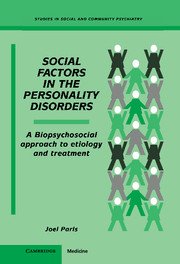Book contents
- Frontmatter
- Contents
- Foreword
- Introduction
- Acknowledgments
- 1 Overview
- 2 Personality Traits and Personality Disorders
- 3 Biological Factors
- 4 Psychological Factors
- 5 Social Factors – Methods
- 6 Social Factors – Mechanisms
- 7 A Biopsychosocial Model of the Personality Disorders
- 8 The Odd Cluster
- 9 The Impulsive Cluster
- 10 The Anxious Cluster
- 11 Treatment
- 12 Clinical Practice
- Epilogue: Summary and Research Implications
- References
- Index
Epilogue: Summary and Research Implications
Published online by Cambridge University Press: 05 May 2010
- Frontmatter
- Contents
- Foreword
- Introduction
- Acknowledgments
- 1 Overview
- 2 Personality Traits and Personality Disorders
- 3 Biological Factors
- 4 Psychological Factors
- 5 Social Factors – Methods
- 6 Social Factors – Mechanisms
- 7 A Biopsychosocial Model of the Personality Disorders
- 8 The Odd Cluster
- 9 The Impulsive Cluster
- 10 The Anxious Cluster
- 11 Treatment
- 12 Clinical Practice
- Epilogue: Summary and Research Implications
- References
- Index
Summary
At this point, it would be useful to summarize the major ideas presented in this book:
Personality disorders have only recently been recognized as categories of psychiatric illness. Yet, these conditions are responsible for disturbances in functioning as great as in other mental disorders.
Personality disorders can best be conceptualized as amplifications of underlying personality traits. The biological factors in their etiology are temperamental variations, which strongly influence traits. The psychological risk factors for personality disorders concern family dysfunction. Social risk factors have their greatest impact on those who are already at biological and/or psychological risk.
Epidemiological research can examine the effects of social factors on the personality disorders by demonstrating differential prevalence of these disorders under different social conditions.
Social factors affect personality structure. One mechanism involves the influence of the social context on family functioning. There have been recent increases in the frequency of breakdown of nuclear families, as well as an increased prevalence of mental disorders affecting parenting capacity. Rapid social change has led to the breakdown of social networks and structures.
A biopsychosocial model of the personality disorders should take into account all the interactions between these factors.
The treatment of personality disorders has had limited results. The persistence of traits is the limiting factor in therapy. However, psychotherapy of the personality disorders might be able to manage these patients better by working with traits, and by focusing on social adaptation and competence.
- Type
- Chapter
- Information
- Social Factors in the Personality DisordersA Biopsychosocial Approach to Etiology and Treatment, pp. 189 - 192Publisher: Cambridge University PressPrint publication year: 1996

